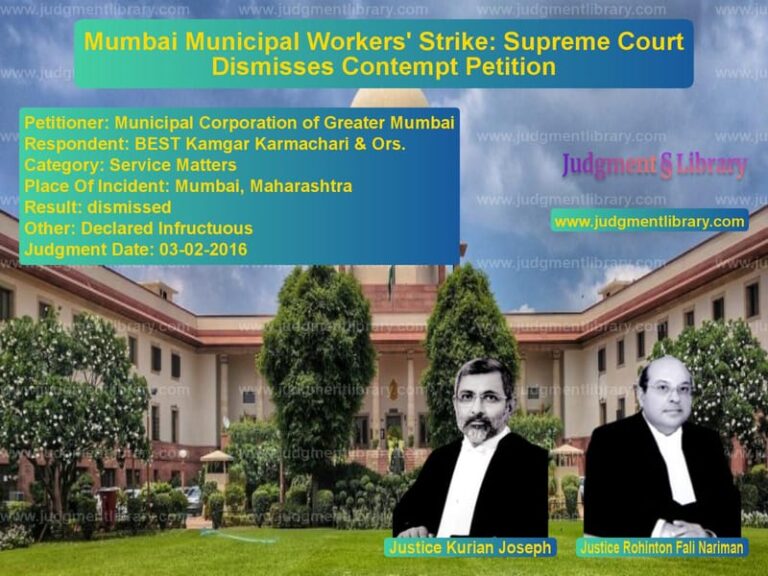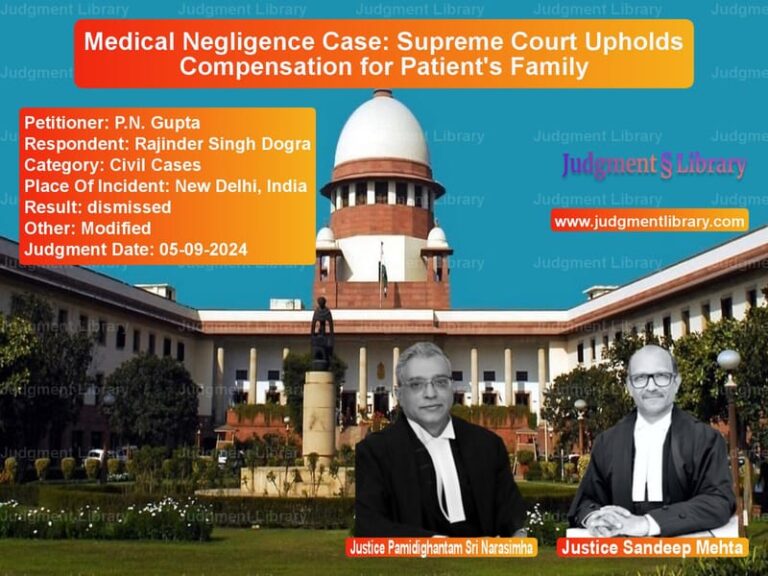Dowry Death Conviction Upheld: Supreme Court Reinforces Section 304-B IPC
The Supreme Court of India has upheld the conviction of Gurmeet Singh under Section 304-B of the Indian Penal Code (IPC) for the dowry death of his wife. The judgment, delivered on May 28, 2021, in Gurmeet Singh v. State of Punjab, reaffirms the legal principles governing dowry death cases and the statutory presumption under Section 113B of the Indian Evidence Act.
Background of the Case
The case concerns the unnatural death of a young married woman, who allegedly consumed poison in her matrimonial home due to continuous harassment over dowry demands.
The key facts as per the prosecution are:
- The deceased was married to the appellant, Gurmeet Singh, on November 23, 2004.
- A child was born to them in 2006.
- The deceased’s father, who frequently traveled abroad, was informed by his daughter about persistent dowry demands, including a car.
- On August 8, 2008, she consumed poison and later died in a hospital.
- The appellant, along with his parents, was charged under Section 304-B IPC for dowry death.
Trial Court Proceedings
The Trial Court convicted the appellant and his parents under Section 304-B IPC, sentencing them to:
- Seven years of rigorous imprisonment.
- A fine of Rs. 5000 each.
The court found that the deceased had been subjected to harassment related to dowry demands shortly before her death.
High Court’s Verdict
The Punjab and Haryana High Court acquitted the appellant’s parents due to lack of evidence but upheld the appellant’s conviction, affirming that the deceased was subjected to dowry-related cruelty before her unnatural death.
Arguments by the Petitioner (Gurmeet Singh)
The appellant’s counsel contended:
- The presumption under Section 113B of the Evidence Act was wrongly applied.
- The deceased had been happy, as evidenced by the birth of her child.
- The gifts given by the deceased’s family were voluntary and did not constitute dowry.
- Without a conviction under Section 498A IPC (cruelty), a conviction under Section 304-B IPC could not be sustained.
- The deceased was suffering from depression due to her mother’s ill health, which could have led to suicide.
Arguments by the Respondent (State of Punjab)
The prosecution, representing the State of Punjab, argued:
- The death occurred within four years of marriage and was unnatural, satisfying the conditions of Section 304-B IPC.
- Fifteen days before the incident, the deceased had informed her father about renewed dowry demands.
- The accused had forged medical records to establish a cordial relationship between the families.
- There was clear evidence of dowry harassment, including testimonies from the deceased’s father and relatives.
Supreme Court’s Observations
1. Elements of Dowry Death Under Section 304-B IPC
The Court laid down that for a case to be categorized as dowry death, the following elements must be satisfied:
- The death occurred within seven years of marriage.
- The cause of death was unnatural, including poisoning or bodily injury.
- The deceased was subjected to cruelty or harassment related to dowry demands soon before her death.
The Court ruled that all these elements were satisfied in the present case.
2. The Presumption Under Section 113B of the Evidence Act
The Court reaffirmed:
“The presumption under Section 113B applies once the prosecution establishes that the death was unnatural and occurred within seven years of marriage due to dowry-related harassment.”
3. ‘Soon Before Death’ Interpretation
The Court clarified that ‘soon before death’ does not mean immediately before but requires a ‘proximate and live link’ between harassment and the unnatural death.
4. No Requirement of Separate Conviction Under Section 498A IPC
The Court rejected the argument that a conviction under Section 304-B IPC must be accompanied by a conviction under Section 498A IPC, stating:
“While cruelty is a common factor, Sections 304-B and 498A IPC are distinct offences and need not always be charged together.”
5. Rejection of Defence Arguments
The Court dismissed the appellant’s claims regarding depression and cordial family relations, stating that no evidence was produced to support these claims.
Final Verdict
The Supreme Court dismissed the appeal and upheld the appellant’s conviction, stating:
“The appellant failed to rebut the statutory presumption under Section 113B of the Evidence Act. The conviction under Section 304-B IPC stands confirmed.”
Conclusion
This judgment serves as a critical precedent in dowry death cases, reinforcing the legal protections for women subjected to dowry harassment. It reiterates the presumption under Section 113B of the Evidence Act, ensuring that perpetrators of dowry-related crimes face stringent legal consequences.
Petitioner Name: Gurmeet Singh.Respondent Name: State of Punjab.Judgment By: Justice N.V. Ramana, Justice Surya Kant, Justice Aniruddha Bose.Place Of Incident: Punjab.Judgment Date: 28-05-2021.
Don’t miss out on the full details! Download the complete judgment in PDF format below and gain valuable insights instantly!
Download Judgment: gurmeet-singh-vs-state-of-punjab-supreme-court-of-india-judgment-dated-28-05-2021.pdf
Directly Download Judgment: Directly download this Judgment
See all petitions in Dowry Cases
See all petitions in Murder Cases
See all petitions in Judgment by N.V. Ramana
See all petitions in Judgment by Surya Kant
See all petitions in Judgment by Aniruddha Bose
See all petitions in dismissed
See all petitions in supreme court of India judgments May 2021
See all petitions in 2021 judgments
See all posts in Criminal Cases Category
See all allowed petitions in Criminal Cases Category
See all Dismissed petitions in Criminal Cases Category
See all partially allowed petitions in Criminal Cases Category







